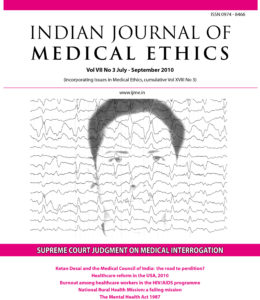
In this issue, we have an editorial slicing through the belated clamour about corruption in the top regulating agency for medical education, the Medical Council of India, to discuss the conditions which make such rampant corruption possible and calls for institutional reform during the reconstitution of the medical council, in whatever shape it takes. At the grassroots level, a veteran practitioner laments the downfall of the National Rural Health Mission due to greed and manipulation. Another editorial comments on a racket in recycling old drugs, pointing out that such practices need to be seen in the larger context of widespread corruption in healthcare.
IJME has consistently opposed the involvement of the medical profession in interrogation through techniques such as narcoanalysis. The recent Supreme Court judgment has banned the use of these techniques without consent. An editorial in this issue comments on the judgment.
A group of researchers calls attention to the crisis of “burnout” among caregivers involved in HIV/AIDS care and points to the urgent need to provide an institutional response to this problem.
The Mental Health Act of 1987 has long been criticised for neglecting the fundamental rights of the mentally ill, over emphasis on inpatient care in mental hospitals and inadequate attention to rehabilitation. A process has started to amend the law. An article in this issue of the journal gives the background to the draft amendments and provides some details on the draft, which is still under discussion. The amendments have been the topic of informal debate and we call upon our readers to contribute to a productive discussion within the pages of the journal.
On the international front, we have a commentary on the US Patient Protection and Affordable Care Act, 2010. This long-awaited legislation aims to cover the majority of Americans under a comprehensive health insurance plan.
Finally, in a case study in this issue, medical students call for clear institutional guidelines on patient management to ensure disciplined coordination among care givers, and two senior medical professionals comment with suggestions. Readers may wish to enrich the discussion with their own experiences.
Cover visual courtesy: Nobhojit Roy
